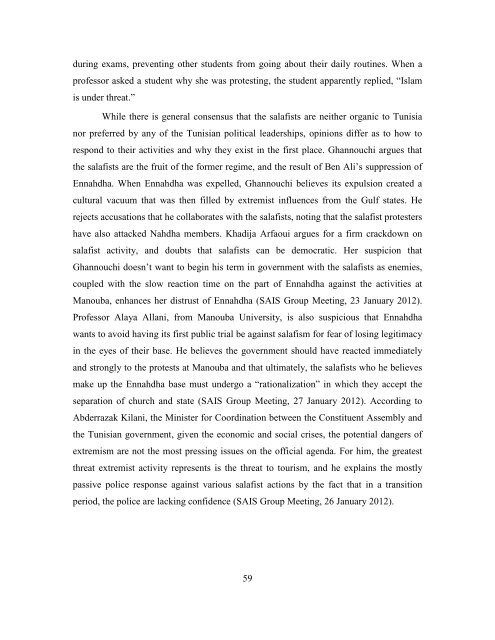Tunisia: Understanding Conflict 2012 - Johns Hopkins School of ...
Tunisia: Understanding Conflict 2012 - Johns Hopkins School of ...
Tunisia: Understanding Conflict 2012 - Johns Hopkins School of ...
You also want an ePaper? Increase the reach of your titles
YUMPU automatically turns print PDFs into web optimized ePapers that Google loves.
during exams, preventing other students from going about their daily routines. When a<br />
pr<strong>of</strong>essor asked a student why she was protesting, the student apparently replied, “Islam<br />
is under threat.”<br />
While there is general consensus that the salafists are neither organic to <strong>Tunisia</strong><br />
nor preferred by any <strong>of</strong> the <strong>Tunisia</strong>n political leaderships, opinions differ as to how to<br />
respond to their activities and why they exist in the first place. Ghannouchi argues that<br />
the salafists are the fruit <strong>of</strong> the former regime, and the result <strong>of</strong> Ben Ali’s suppression <strong>of</strong><br />
Ennahdha. When Ennahdha was expelled, Ghannouchi believes its expulsion created a<br />
cultural vacuum that was then filled by extremist influences from the Gulf states. He<br />
rejects accusations that he collaborates with the salafists, noting that the salafist protesters<br />
have also attacked Nahdha members. Khadija Arfaoui argues for a firm crackdown on<br />
salafist activity, and doubts that salafists can be democratic. Her suspicion that<br />
Ghannouchi doesn’t want to begin his term in government with the salafists as enemies,<br />
coupled with the slow reaction time on the part <strong>of</strong> Ennahdha against the activities at<br />
Manouba, enhances her distrust <strong>of</strong> Ennahdha (SAIS Group Meeting, 23 January <strong>2012</strong>).<br />
Pr<strong>of</strong>essor Alaya Allani, from Manouba University, is also suspicious that Ennahdha<br />
wants to avoid having its first public trial be against salafism for fear <strong>of</strong> losing legitimacy<br />
in the eyes <strong>of</strong> their base. He believes the government should have reacted immediately<br />
and strongly to the protests at Manouba and that ultimately, the salafists who he believes<br />
make up the Ennahdha base must undergo a “rationalization” in which they accept the<br />
separation <strong>of</strong> church and state (SAIS Group Meeting, 27 January <strong>2012</strong>). According to<br />
Abderrazak Kilani, the Minister for Coordination between the Constituent Assembly and<br />
the <strong>Tunisia</strong>n government, given the economic and social crises, the potential dangers <strong>of</strong><br />
extremism are not the most pressing issues on the <strong>of</strong>ficial agenda. For him, the greatest<br />
threat extremist activity represents is the threat to tourism, and he explains the mostly<br />
passive police response against various salafist actions by the fact that in a transition<br />
period, the police are lacking confidence (SAIS Group Meeting, 26 January <strong>2012</strong>).<br />
59
















